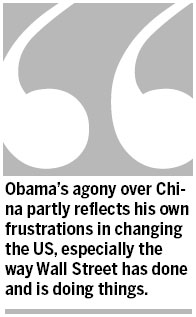
US presidential hopefuls like to portray China as a rival because they don't have any answers to country's woes.
The election is getting nasty in the United States. Slandering, after all, is not something US politicians are shy of. Republican candidates have to attack each other to garner votes from one state to another if they want to win the nomination race, and they mustn't forget to take digs at their "common enemy", US President Barack Obama. Irrespective of the reasons, all the Republican candidates have depicted Obama as a person of buoyant naivet. That was why Arizona Governor Janice Brewer dared to point the finger at her commander-in-chief at the airport.
All this has made it relatively easy for Obama to play tough. One of his pet areas seems to be China's exchange rate policy, as Obama and US Secretary of the Treasury Tim Geithner have repeatedly accused China of suppressing the yuan's value.
They have been more prudent in practice, though. For example, when the Senate was about to vote on a bill to punish "currency manipulators" last fall, the White House put it off with strong words and possibly behind-the-scene political maneuvers. Senior economic officials in the Obama administration know that unless all the major Asian currencies increase in value, even a drastic revaluation of the yuan would simply mean US imports from China would just switch to the other countries in the region.
Yet the rhetoric has had a real effect on US politics. For American "Main Streeters", China is becoming more a rival than a friend. For the more strategically minded people in the government, China's defiance is a sign of its intention to challenge the US' dominance in world affairs.
For a long time, the US elite has believed that engaging China is a good thing for the US. Now that belief has faltered; "hedging" is replacing "engagement" as the keyword in Washington's political circles. That was why the South China Sea has cropped up as an issue. China's South China Sea policy has remained consistent. What has changed is the US' view. This is where the business could get serious and potentially dangerous.
The US elite acknowledge the rise of China as a historical inevitability. What they are not prepared for is the impact that China's rise will have on the world. In the economic arena, this is manifested by their obsession with the trade imbalance between the two countries, although it is part of the inevitable rise of China.
The United Kingdom and the US have had large current account surpluses for long periods - the UK from the early 19th to the early 20th century and the US from the end of World War II to 1980. From a historical perspective, global imbalances were a natural result of unbalanced growth among large countries.
The reason is simple: fast growing countries saved more, yet international capital movement tended to equalize capital demand across countries and, therefore, fast growing countries ended up on the surplus side exporting capital and countries growing slowly ended up on the deficit side importing capital.
If the UK and the US could accumulate large surpluses during their fast growing periods - in fact, Germany and Japan did the same during their rebuilding periods after the World War II - there is no reason why China cannot do so during its period of fast growth. China's current account surplus is only a decade old, so the world should be prepared for a longer period of persistent Chinese surplus.
Obama's agony over China partly reflects his own frustrations in changing the US, especially the way Wall Street has done and is doing things. One of the causes of the US' large current account deficit is its crown advantage - the supremacy of its financial sector. One of the oddest things in the world financial market is that investors always go for the US dollar whenever other currencies show signs of a downturn.
Wall Street, on the other hand, works seamlessly to keep the money inside the country. It works so well and creates so much wealth that it has become the honey pot that attracts young talent. An MIT graduate's greatest ambition is no longer to become the chief engineer in a top US company, but to become a Wall Street executive.
While both create wealth, a chief engineer and a Wall Street executive have different effects on the US economy as a whole: a chief engineer can increase the chances of the US becoming a net creditor by increasing its exports, while a Wall Street executive increases its chances of becoming a net debtor by importing money.
Obama has realized the problem but has been struggling to find a solution. Instead, like any typical American liberal, he resorts to populist rhetoric to blame Wall Street's greed for the mess. The US president is relatively young, but the country is going through a middle-age crisis - life is comfortable but you still feel something is wrong, and yet you don't have the guts to face it because you fear you will lose the comfort.
The author is professor and director of China Center for Economic Research, Peking University.
(China Daily 02/15/2012 page8)